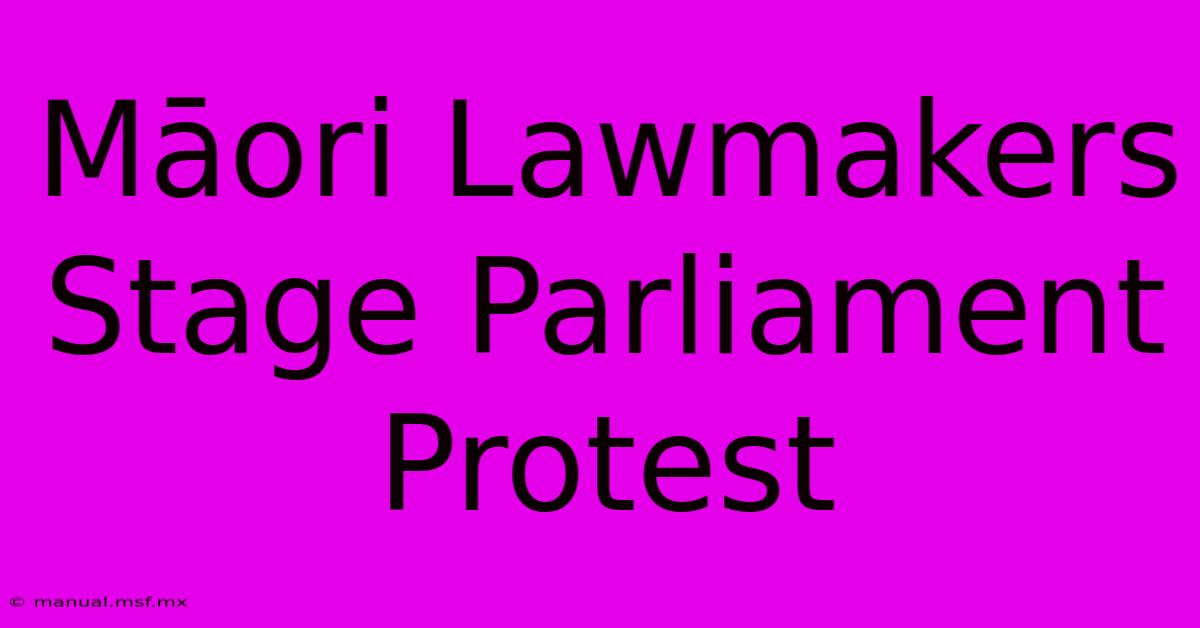Māori Lawmakers Stage Parliament Protest

Discover more detailed and exciting information on our website. Click the link below to start your adventure: Visit Best Website. Don't miss out!
Table of Contents
Māori Lawmakers Stage Parliament Protest: A Fight for Recognition and Representation
What is the significance of the Māori lawmakers staging a protest in Parliament? This bold act signifies a deep-rooted frustration with the lack of recognition and representation of Māori interests within the New Zealand political system.
Editor Note: This article aims to provide a comprehensive analysis of the recent protest by Māori lawmakers in the New Zealand Parliament, examining the historical context, key demands, and potential implications.
This event serves as a crucial reminder of the ongoing struggle for Māori self-determination and the need for meaningful engagement with Māori perspectives within the political landscape.
Analysis: This analysis explores the motivations behind the protest, dissecting the historical context of Māori-Crown relations, the key demands of the Māori lawmakers, and the potential impact on future political discourse.
Key Takeaways of Māori Parliament Protest:
| Aspect | Description |
|---|---|
| Historical Context | Māori Treaty Rights & Ongoing Disparity |
| Key Demands | Self-determination, Treaty Implementation, Representation |
| Potential Implications | Increased Political Awareness, Policy Change, Constitutional Review |
Māori Lawmakers Stage Parliament Protest
Introduction: This section delves into the historical context of Māori-Crown relations, highlighting the Treaty of Waitangi and its ongoing relevance in contemporary New Zealand society.
Key Aspects:
- Treaty of Waitangi: The foundational document of New Zealand, outlining the relationship between the Māori and the British Crown.
- Treaty Violations: Historical breaches of the Treaty, leading to ongoing disparities in social, economic, and political spheres.
- Self-determination: Māori aspirations for autonomy and control over their own affairs.
Discussion: This section examines the key demands of the Māori lawmakers, emphasizing their call for greater recognition and representation within the political system.
Key Demands
- Treaty Implementation: Prioritizing the full implementation of the Treaty of Waitangi in all government policies and legislation.
- Self-determination: Seeking greater autonomy and decision-making power over Māori affairs.
- Representation: Demanding proportional representation of Māori voices in Parliament, reflecting their population percentage.
Further Analysis: This section explores the potential implications of the protest, including its impact on political awareness, policy change, and constitutional review.
Potential Implications:
- Increased Political Awareness: The protest may heighten awareness among non-Māori citizens about the ongoing challenges faced by Māori.
- Policy Change: The protest could pressure the government to address key issues of concern to Māori through policy changes.
- Constitutional Review: The protest may serve as a catalyst for a wider conversation about constitutional reform and the inclusion of Māori perspectives.
FAQ
Introduction: This section addresses common questions and misconceptions surrounding the protest.
Questions:
- Why did the Māori lawmakers protest? The protest was staged to highlight the lack of recognition and representation of Māori interests within the political system.
- What are the key demands of the protest? The main demands include full implementation of the Treaty of Waitangi, self-determination, and proportional representation.
- What are the potential consequences of the protest? The protest could lead to increased political awareness, policy changes, and even constitutional review.
- How can non-Māori citizens support the cause? Non-Māori citizens can support the cause by educating themselves about the Treaty of Waitangi and its relevance, advocating for Māori rights, and engaging in respectful dialogue.
- What are the future prospects of the protest? The protest serves as a significant step towards achieving greater recognition and representation for Māori within the political landscape.
- What is the overall significance of the protest? The protest highlights the ongoing fight for Māori self-determination and the need for meaningful engagement with Māori perspectives within the political system.
Summary: The recent protest staged by Māori lawmakers in Parliament represents a significant moment in New Zealand's political landscape, highlighting the enduring struggle for Māori rights and self-determination. It serves as a call to action for the government to address the historical injustices and ongoing inequalities faced by Māori, paving the way for a more inclusive and equitable society.
Closing Message: The protest underscores the importance of ongoing dialogue and collaboration between Māori and non-Māori communities to ensure that the principles of the Treaty of Waitangi are upheld and that Māori have a voice in shaping their future.
This analysis of the Māori lawmakers' protest aims to shed light on the complexities of the issue, promoting understanding and fostering dialogue towards a more inclusive and equitable New Zealand society.

Thank you for visiting our website wich cover about Māori Lawmakers Stage Parliament Protest. We hope the information provided has been useful to you. Feel free to contact us if you have any questions or need further assistance. See you next time and dont miss to bookmark.
Also read the following articles
| Article Title | Date |
|---|---|
| Space X Completes Two Launches In 4 Hours | Nov 15, 2024 |
| Trump Nomina Hegseth Contro Nato Ed Europa | Nov 15, 2024 |
| Englands Rise Above Greece In Nations League | Nov 15, 2024 |
| App Poste Id Non Funzionante Spid Down | Nov 15, 2024 |
| Iniesta Del Campo Al Banquillo En Helsingor | Nov 15, 2024 |
| Speltips Modo Faerjestad 14 11 Odds | Nov 15, 2024 |
| Forlans Profdebuut In Andere Sport Verlies | Nov 15, 2024 |
| Chinas Ai Weapon Radar Destruction | Nov 15, 2024 |
| Brand Woongroep Assen Graswijk | Nov 15, 2024 |
| Bothams Daughter Lords No Show Reason | Nov 15, 2024 |
